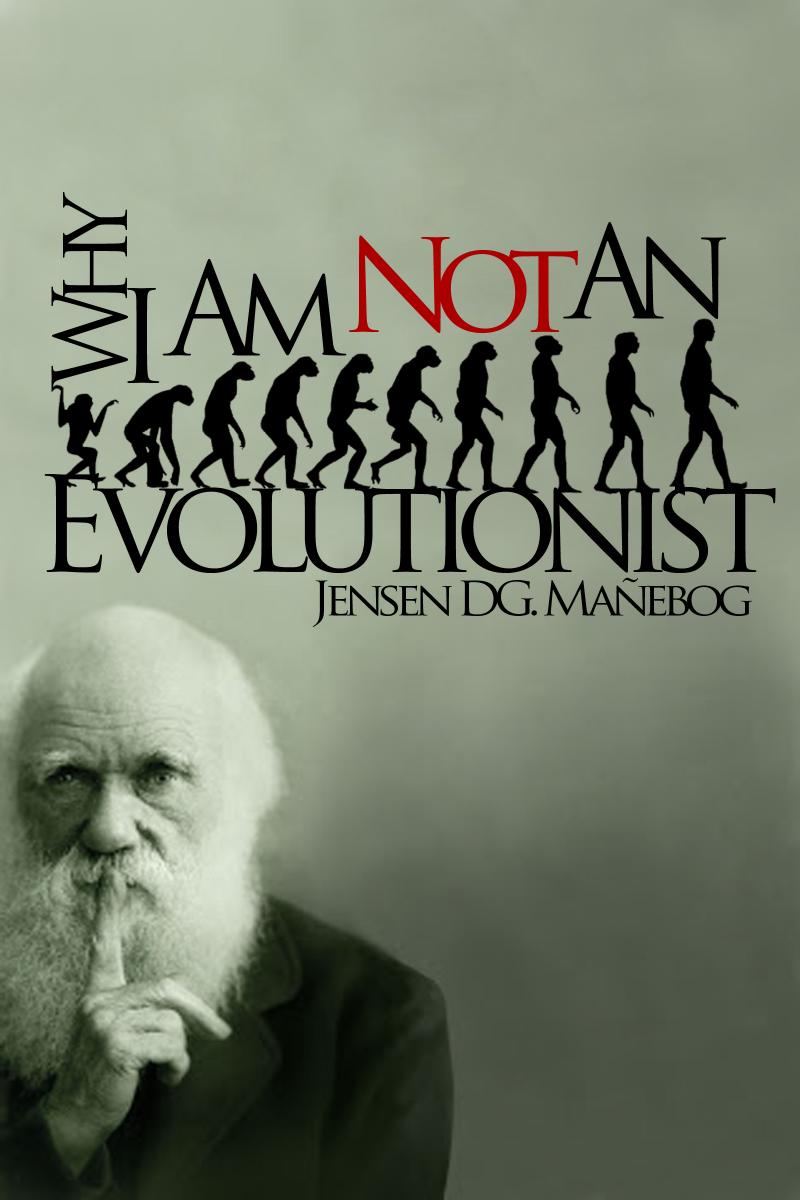Sponsored Links
Darwinist-evolutionist worldview: some defects
© 2011 by Jensen DG. Mañebog
 IF DARWINISM AND EVOLUTIONISM were a viable worldview worthy of being a foundation of man’s set of beliefs especially in relation to morality, then it must at least be capable of explaining the origin of life, especially that of human life. Unfortunately, nothing in evolution satisfactorily explains the origin of life.
IF DARWINISM AND EVOLUTIONISM were a viable worldview worthy of being a foundation of man’s set of beliefs especially in relation to morality, then it must at least be capable of explaining the origin of life, especially that of human life. Unfortunately, nothing in evolution satisfactorily explains the origin of life.
Can not satisfactorily explain the origin of life
Professor of Zoology H. Enoch explains what the evolutionists did in their attempts to explain the origin of life:
“Darwin himself speculated that spontaneous generation of life may have occurred by chance formation of proteid in “some warm little pond with all sorts of ammonia and phosphoric acid salts, light, heat and electricity”. Since his day various attempts have been made by organic chemists and biochemists to produce life in the laboratory. All such attempts have proved failures.” [55] (emphasis added)
Dr. Paul A. Zimmerman of Michigan also shares this view:
“Modern bio-chemical research has served to unravel much of the mystery of the chemistry of life. But… [l]ike the mystery of the atom the mystery of life also evades scientific investigation. Life suddenly appeared on earth not as a tiny speck of protoplasm, as evolutionists tell us….” [56] (emphasis added)
[Evolutionists like] Richard Dawkins would of course claim, and he indeed does, that the existence of all life is explained by Natural Selection which for him is a “blind, unconscious, no purpose, no mind, no vision, no foresight, no sight at all, automatic process [58]. In other words, life accordingly originated through intrinsically directionless series of processes as opposed to the planned and decisive creation by God. However, scientific findings illustrate, as Professor Enoch explains, that life is dependent upon so many synchronising factors, which are essential not only for the maintenance of life but also for its origin. “There are millions of protein molecules even in a single cell. These molecules and other particles in the cell would also need to be focused at the same place and at the same time. The odds against such happening accidentally would be a number that the world cannot contain.” [59]
 As A. I. Oparin, the Russian biologist who fathered the theory of spontaneous generation, had expressed: “To the student of protein structure the spontaneous formation of such an atomic arrangement in the protein molecule would seem as improbable as would the accidental origin of the text of Virgil’s Aneid from scattered letter type.”[60]
As A. I. Oparin, the Russian biologist who fathered the theory of spontaneous generation, had expressed: “To the student of protein structure the spontaneous formation of such an atomic arrangement in the protein molecule would seem as improbable as would the accidental origin of the text of Virgil’s Aneid from scattered letter type.”[60]
Hence, as if to address the typical evolutionist’s explanation as expressed by Dawkins, biologist Edwin Conklin, knowing the “un-simplifiable” nature of what we call ‘life’, stated thus: “The probability of life originating by accident is comparable to the probability of the unabridged dictionary originating from an explosion in a print shop.” [61]
Evolution’s implicit reasoning is flawed
Fellow of the Royal Society of Literature and professor of Philosophy at the University of Nice E.W.F. Tomlin (C.B.E.) believes that evolution was a “hypothesis which hardened into dogma before it had been thoroughly analyzed”. One consequence of this, he claims, is that “it mothered a number of fallacies.” [71]…
As to Darwinists’ confident assumption that the origin and formation of species can be explained as a succession of fortuitous variations and mutations passing through the mesh of selection, Tomlin sees it nothing less than ‘odd’. “The oddity of this theory”, he says, is “partially concealed by its mode of presentation. The order and coherence of organisms are so obvious as to demand an explanation which is both ordered and coherent; and this is supposedly met by the contention that, in the struggle for survival, the unfavourable mutations are severally eliminated.” Such a view, he believes, “depends upon certain well-concealed assumptions.” [74] …
Even the implied argument of evolutionists that sounds like “evolution must be true because there is no explanation on the scientific level that can seriously compete with its explanation of the various findings”—like in fossil records, comparative anatomy, and in fields of molecular genetics and geographical distribution in which, according to Dawkins, evidence for evolution is “overwhelmingly strong”—is definitely not conclusive and is obviously logically flawed, though it might have attracted some. Being true, absolutely, is not equivalent to being the best today in a particular limited field of knowledge (such as science).
‘Against common sense’
… While basing the ethical theory he proposes on Darwinism, [Dawkins ironically] admits that evolution is against common sense. In an interview by a representative of Microsoft Encarta, Dawkins says the following about understanding evolution:
"There are particular difficulties in understanding evolution… there is also the suspension of common sense that you have to undergo. You have to force yourself to accept highly counterintuitive beliefs in order to grasp quantum theory even partly. Evolution has a bit of that… to put all those little steps together, one after another, cumulatively, to produce the change from a bacterium to a human is something that challenges naive common sense ..."[78] (emphasis added)
Introduced by Dawkins as a “blind, unconscious, no purpose, no mind, no vision, no foresight, no sight at all, automatic process” [79], natural selection is considered by Philosophy professor and writer E.W.F. Tomlin as vague and elusive:
“We now perceive the insufficiency of the popular idea of evolution as moving forward in a trial-and-error fashion and throwing up new species from time to time as a result of the operation of fortuitous variations—strokes of luck becoming strokes of genius—and exhibiting purpose-like behaviour which, at the super-stroke of genius, man turns into purpose-ful behaviour.” [81]
By analogy, he pointed out afterwards that, “Fluctuations cannot negotiate in the void for the production of organic wholes or unities, or for the generation of order, any more than business transactions can be negotiated in the absence of economic norms or a common commercial code.” [82]
As regards man’s exclusive ability to behave in the explicit sense and to have conscious activity which entails the use of organic tools, these tools themselves, according to Tomlin,
“… cannot have come into being by a series of mutation due to mechanical faults of copying: and the same applies to the brain and the nervous system. These organs are the means whereby higher evolution is directed: to describe theirdevelopment to the play of blind forces is to suspend rational judgment and to betray the cause of science …" [84] (emphasis added)
Logician Joe Carter agrees to this point. Singling out Dawkins as a case, he observes that the evolutionist, by endorsing Natural Selection, “follows the typical atheist tactic of making an irrational leap of faith by embracing mysticism.” [86] (emphasis added)
Darwinism can not account for Morality
… Dawkins believes that one can be an atheist and be, among others, “moral”[99]. In The God Delusion, he even suggests that moral values— along with minds, beauty, emotions—compose “the full gamut of phenomena that gives richness to human life.” [100] But while subscribing to Darwinist worldview, can anyone (not just Dawkins) truly acknowledge morality?
 Darwinists generally consider ethics to be nothing more than a human invention or a biological adaptation that is conducive to our survival and reproduction. Famous Darwinists Michael Ruse and E.O. Wilson confess: “Ethics as we understand it is an illusion fobbed off on us by our genes in order to get us to cooperate.” [101] In his The Darwinian Paradigm, Ruse further avers that morality—along with our hands, feet, and teeth—is the “ephemeral product” of evolution and simply “an aid to survival and reproduction, and has no being beyond this.”[102] Michael Shermer correspondingly explains that to ask why we should be moral is like asking why we should itch or be hungry [103]. Clearly, morality in Darwinist worldview only has biological worth—an adaptive feature which enables survival and reproduction.
Darwinists generally consider ethics to be nothing more than a human invention or a biological adaptation that is conducive to our survival and reproduction. Famous Darwinists Michael Ruse and E.O. Wilson confess: “Ethics as we understand it is an illusion fobbed off on us by our genes in order to get us to cooperate.” [101] In his The Darwinian Paradigm, Ruse further avers that morality—along with our hands, feet, and teeth—is the “ephemeral product” of evolution and simply “an aid to survival and reproduction, and has no being beyond this.”[102] Michael Shermer correspondingly explains that to ask why we should be moral is like asking why we should itch or be hungry [103]. Clearly, morality in Darwinist worldview only has biological worth—an adaptive feature which enables survival and reproduction.
We have at least two basic comments: 1) This evolutionary worldview in relation to morality obviously commits the ‘is-ought problem’; and connectedly, 2) This explanation cannot really account for moral obligations and genuine moral values.
Philosopher Paul Copan, explaining Darwinism’s guilt of “is-ought’ fallacy, states:
“… how do we move from the ‘is’ of nature and science to the ‘ought’ of moral obligation and value. If our morality is simply evolved, all we can do is describe how human beings actually function; we can’t prescribe how humans ought to behave. There’s no difference between whether I ought to be moral and whether I ought to be hungry since both are functions of evolutionary hardwiring. These states just are." [104] (emphasis added)
Concerning our comment number 2—Darwinism being not able to account for moral obligations and genuine moral values—… philosopher Deane-Peter Baker pertinently comments, “once one recognizes that, in evolutionary terms, morality is simply a kind of shortcut way of ensuring evolutionary fit, it’s hard to see why one should care much about morality at all.” [106].
… It is therefore astonishingly awkward that Dawkins, or any other evolutionist, can feel comfortable using or even recognizing such notions as “good or bad”, “moral or immoral”. As P.M. Doyle comments, “Within Dawkins’ framework, terms such as “good” and “bad” aren't just different or a tad shallower than otherwise; they are rendered completely unrecognizable. In fact, it is downright weird to read Dawkins’ beliefs about such concepts.” [111]
Finally, our biggest witness to the fact that evolutionary worldview cannot account for moral concepts such as notions of good and bad is none other than Richard Dawkins himself. In a debate against Dawkins, well known scientist Francis Collins points out:
“For you to argue that our noblest acts are a misfiring of Darwinian behavior does not do justice to the sense we all have about the absolutes that are involved here of good and evil. Evolution may explain some features of the moral law, but it can’t explain why it should have any real significance. If it is solely an evolutionary convenience, there is really no such thing as good or evil. …. What you’ve said implies that outside of the human mind, tuned by evolutionary processes, good and evil have no meaning”…[112]
So Collins is suggesting that in evolutionary worldview, good and evil have no meaning. When he afterwards asks Dawkins, “Do you agree with that?”, the evolutionist is forced to bluntly answer, “Even the question you’re asking has no meaning to me. Good and evil—I don’t believe that there is hanging out there, anywhere, something called good and something called evil.”. So there he is, ‘Darwin’s apostle’ bravely confirms our point here that Darwinism is simply incapable to account for morality.






